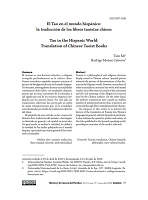Tao in the Hispanic World: Translation of Chinese Taoist Books
DOI:
https://doi.org/10.32870/mycp.v13i37.868Keywords:
Taoism, translation, Chinese-Spanish, philosophy, cross-cultural studiesAbstract
Taoism is a philosophical and religious doctrine deeply rooted in Chinese culture. Spanish priests initiated the process of dissemination of this doctrine in the Hispanic world. However, researchers of other nationalities continued this work, with mixed results, since they were not aware of the synonymy and the real meaning of the allegorical resources used by the Chinese authors. On the other hand, the indirect translations have caused an endless number of misinterpretations that, at present, are corrected through direct translations from Chinese. The purpose of this article is to present the history of the translation of Taoism into Western languages in general, and into Spanish in particular. It also analyzes the quantity, quality and variety of the titles published in the Spanish-speaking world, providing an overview of the results achieved.Downloads
References
Cleary, T. (1993). Translator’s Afterword: Modern Applications of the Golden Flower Method en T. F. Cleary (Ed.), The Secret of the Golden Flower: The Classic Chinese Book of Life. Harper.
Costantini, F. (2022). The LATAM’s Laozi: The Reception and Interpretations of the Laozi in Latin America. Religions, 13(10), 952.
Fang, W. (2015). Lianggeren he liangbenshu——Jung, Wilhelm he liangbu zhongguo dianji [Dos personas, dos libros: C.G. Jung, Richard Wilhelm y dos libros clásicos chinos]. Qinghua University Journal, 2, 116-129.
Guying, C. (2017). Lao zi jinzhu jinyi [Notas y traducciones contemporáneas de Lao zi]. Prensa comercial.
Guying, C. (2012). Daojiade renwen jinshen [El espíritu humanista del taoísmo religioso]. Zhonghua Book Company.
Lu?, D. (1996). El secreto de la flor de oro: Un libro de la vida chino (R. Pope, Trans.). Paidós Ibérica.
Real Academia Española (RAE). (2014). Diccionario de la lengua española. Espasa.
Tadd, M. (2019). Lao Zi yiben zongmu. [El catálogo completo de Lao Zi]. Sinología de China, 7, 90-122.
Xin, H. (2019). Dao sixiangyihande shijiexing yiyi [El significado mundial de las conotaciones de Tao]. Hunan Technology University Journal (Social Sciences Branch), 134-140.
Xun, L. (2005). Lu Xun Quanji [Obras completas de Lu Xun]. Literatura del pueblo.
Youlan, F. (2014). Zhongguo zhexue jianshi [Breve historia de la filosofía de China]. Yilin Press.
Yu, S. (2020). Daojing yinyishi [Historia de traducción al inglés de los clásicos taoístas]. Joint Publishing Company.
Zhang, C. (2020). Faguo hanxuejiade daojiao yanjiu. [Estudios sobre el taoísmo de los sinólogos franceses]. Sichuán University Press.
Zhang, G. (2001). Mingqing chuanjiaoshi yu ouzhou hanxue. [Misioneros de las dinastías Ming y Qing y la sinología europea]. Ciencia social de China.
Zhao, B. (2020). Tratado de alquimia y medicina taoísta (F. F. Villalba, Trans.). Miraguano Ediciones.
Zhuang, Z. (2017). Chuang Tze (O. Paz, Trans.). Ediciones Siruela.
Zi, L. (1961). La gnosis taoísta del Tao Te Ching (C. Elorduy, Trans.). Edición Facultad Teológica de Oña.
Zi, L. (1995). Tao Te Ching (J. R. Álvarez, Trans.). Editorial Almagesto.
Zi, L. (2006). Tao Te Ching: Los libros del Tao (I. Preciado Idoeta, Trans.). Trotta.
Zi, L. (2017). Tao Te Ching (G. García-Noblejas, Trans.). Alianza Editorial.

Downloads
Published
Versions
- 2024-11-29 (3)
- 2023-12-15 (2)
- 2023-12-15 (1)
How to Cite
Issue
Section
License
Copyright (c) 2023 México y la Cuenca del Pacífico

This work is licensed under a Creative Commons Attribution-NonCommercial 4.0 International License.
Open Access Policy
This journal provides open access to all its contents, in adherence to the principle that making research freely available supports a greater global exchange of knowledge.
MyCP is licensed under a Creative Commons Attribution-NonCommercial license, also known as CC BY-NC.
Contents are published in both PDF and XML formats.
Authors who publish in México y la Cuenca del Pacífico must accept the following conditions:
Pursuant to Mexican copyright laws, México y la Cuenca del Pacífico acknowledges and respects the authors’ moral right and ownership of property rights, which will be assigned to the University of Guadalajara to publish the articles in an open-access mode.
México y la Cuenca del Pacífico does not charge the authors any fees for receiving and processing their articles.
Authors are permitted to enter into other independent and additional contractual agreements for the non-exclusive distribution of the article version published in México y la Cuenca del Pacífico (for example, publishing it in an institutional repository or in other printed or electronic media) as long as they clearly state that the piece was originally published in México y la Cuenca del Pacífico.
Pursuant to the above, once the article is approved for publication, authors must send the Assignment of Rights Agreement form duly filled and signed. This form must be sent to mexicoylacuenca@gmail.com as a PDF file.
Readers/users of México y la Cuenca del Pacífico can freely access the journal new issues as soon as they are uploaded. Readers/users are allowed to cite, share (both electronically and physically), print and distribute the material, provided they expressly state that the work was originally published in México y la Cuenca del Pacífico. Contents are to be properly cited and never for commercial purposes.




